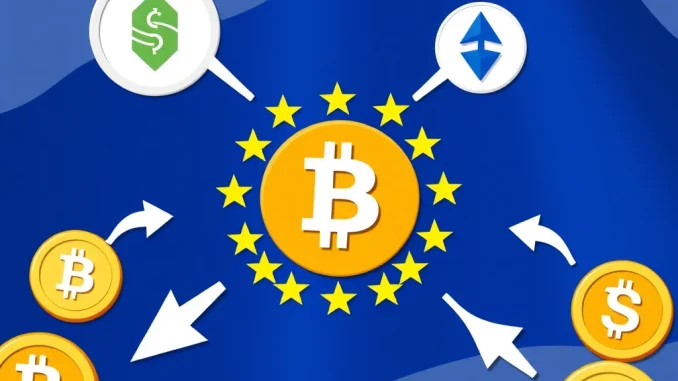
Big news for crypto enthusiasts and investors in Europe! Major U.S. crypto exchanges Coinbase and Gemini are reportedly on the verge of securing crucial licenses that will allow them to operate across the entire European Union. This development, reported by Reuters citing sources familiar with the matter, signals a significant step for these platforms in expanding their reach and navigating the evolving landscape of crypto regulation Europe.
Why is an EU Crypto License Under MiCA So Important?
Securing an EU crypto license is a game-changer for non-European crypto firms looking to serve the vast European market. The key lies in the new Markets in Crypto-Assets Regulation (MiCA), a landmark regulatory framework that took effect earlier this year.
Here’s why MiCA regulation is a big deal:
- Harmonization: MiCA aims to create a single, consistent set of rules for crypto assets and service providers across all 27 EU member states. This replaces the previous patchwork of national regulations, which was often confusing and fragmented.
- Passporting Rights: One of MiCA’s most attractive features is the ‘passporting’ system. Once a crypto firm secures a license in one EU country under MiCA, that license is recognized across the entire bloc. This means they don’t need to apply for separate licenses in every single country.
- Consumer Protection & Market Integrity: MiCA introduces stringent requirements for crypto firms regarding governance, risk management, consumer disclosure, and market abuse prevention. This is designed to enhance investor confidence and bring more legitimacy to the crypto space in Europe.
For exchanges like Coinbase and Gemini, obtaining a license under MiCA provides regulatory clarity and unlocks the potential to seamlessly offer their services to millions of users across the EU without facing individual national hurdles repeatedly.
Coinbase and Gemini’s Path to European Expansion
According to the Reuters report, both Coinbase and Gemini are actively pursuing their first EU licenses. Coinbase is expected to secure its initial EU crypto license in Luxembourg, while Gemini is likely to receive its in Malta. These countries have often been proactive in establishing regulatory frameworks for crypto assets, potentially offering a clearer or faster path to initial approval under the new MiCA rules.
For Coinbase, a prominent global exchange, securing a Coinbase EU license is crucial for solidifying its presence in a key international market. Similarly, a Gemini EU license would significantly bolster Gemini’s global footprint and competitive position against other exchanges vying for European users.
Their strategy appears to be focused on getting that crucial first license in a supportive jurisdiction, enabling them to then ‘passport’ their services across the rest of the EU. This approach leverages the core benefit of the MiCA framework.
What Benefits Do These Licenses Offer Crypto Exchanges in Europe?
Beyond just the ability to operate legally, securing an EU crypto license under MiCA offers several compelling advantages for platforms like Coinbase and Gemini:
- Access to a Single Market: The most obvious benefit is gaining regulated access to over 450 million potential customers across 27 countries with a single license.
- Regulatory Certainty: Operating under a clear, comprehensive framework like MiCA reduces legal uncertainty and compliance risks compared to navigating disparate national rules.
- Enhanced Trust and Credibility: Holding an EU license signals regulatory compliance and commitment to consumer protection, which can attract both retail and institutional investors who prioritize regulated platforms.
- Level Playing Field: MiCA creates a more level playing field among regulated crypto firms operating in the EU, fostering fair competition.
- Attracting Institutional Capital: Regulatory clarity is often a prerequisite for larger financial institutions to enter the crypto space. MiCA licenses can make platforms more attractive to institutional investors seeking compliant avenues.
Essentially, these licenses provide a stamp of approval that is increasingly vital in the maturing crypto industry.
Navigating Regulatory Divergence in EU Crypto Regulation
While MiCA aims for harmonization, the Reuters report also highlights a growing divergence among national regulators regarding the pace and criteria for approving crypto firms. This indicates that even under a unified framework, the implementation and interpretation of rules can vary from country to country.
Points of potential divergence might include:
- Speed of Processing: Some national regulators may be faster or slower in processing license applications.
- Interpretation of Requirements: While MiCA provides the framework, national authorities might have slightly different interpretations or specific local requirements layered on top.
- Supervisory Approach: The intensity and focus of ongoing supervision post-licensing could differ between member states.
This means that while the license grants EU-wide access, crypto firms will still need to navigate nuances in dealing with different national competent authorities. This highlights that even with MiCA, the landscape of crypto regulation Europe isn’t entirely uniform in practice, requiring careful attention to local specifics.
What Does This Mean for the Market?
The likely licensing of major players like Coinbase and Gemini under MiCA is a positive signal for the European crypto market. It demonstrates that the regulatory framework is becoming operational and that significant global firms are committing to operating within it. This could encourage other international exchanges to follow suit and potentially accelerate the adoption of regulated crypto services across the EU.
For European users, this could mean more choice among regulated platforms, potentially leading to increased security and consumer protection when using services provided by these licensed entities.
Conclusion: A Pivotal Moment for Crypto in Europe
The news that Coinbase and Gemini are likely to secure their first EU crypto license under the groundbreaking MiCA regulation marks a pivotal moment. It underscores the growing importance of regulatory compliance for major crypto exchanges and signals a significant step towards the maturation of the European crypto market. While challenges related to regulatory divergence among member states persist, the ability for firms like Coinbase and Gemini to leverage a single license for operations across the bloc offers a major boost for their European ambitions and for the regulated growth of crypto exchanges Europe as a whole. This development sets a clear precedent and highlights the EU’s increasing role in shaping the future of global crypto regulation.



